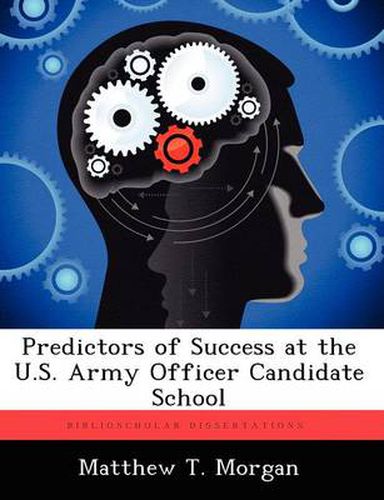Readings Newsletter
Become a Readings Member to make your shopping experience even easier.
Sign in or sign up for free!
You’re not far away from qualifying for FREE standard shipping within Australia
You’ve qualified for FREE standard shipping within Australia
The cart is loading…






This title is printed to order. This book may have been self-published. If so, we cannot guarantee the quality of the content. In the main most books will have gone through the editing process however some may not. We therefore suggest that you be aware of this before ordering this book. If in doubt check either the author or publisher’s details as we are unable to accept any returns unless they are faulty. Please contact us if you have any questions.
The U.S. Army Officer Corps is composed of officers with varying backgrounds, education, experience, commissioning source, and resources required to produce those officers. The Army has invested varying resources depending on the officer and commissioning source. The Office of Economic and Manpower Analysis has found that the Officer Candidate School In Service (OCS-IS) officer is the most resource intensive officer to produce because of the cost to replace an experienced soldier and their educational costs. Some may expect experience of OCS-IS coupled with the greater cost, would yield greater performance from that group when compared to Enlistment Option Candidates (OCS-EO). The central research question was: How does the experience of OCS-IS affect the performance at OCS, as indicated by Distinguished Military Graduate (DMG) status? DMG status is equally available to all OCS students. How do the following variables impact DMG status of OCS-IS and OCS-EO: (1) degree achievement, (2) time in military service, (3) military rank, and (4) combat experience. Results: This study found that OCS-IS students from the class of 2008, were more likely to earn DMG status than their OCS-EO peers. Among OCS-IS students, the variables: time in military service; and prior military rank; supported DMG list attainment.
$9.00 standard shipping within Australia
FREE standard shipping within Australia for orders over $100.00
Express & International shipping calculated at checkout
Stock availability can be subject to change without notice. We recommend calling the shop or contacting our online team to check availability of low stock items. Please see our Shopping Online page for more details.
This title is printed to order. This book may have been self-published. If so, we cannot guarantee the quality of the content. In the main most books will have gone through the editing process however some may not. We therefore suggest that you be aware of this before ordering this book. If in doubt check either the author or publisher’s details as we are unable to accept any returns unless they are faulty. Please contact us if you have any questions.
The U.S. Army Officer Corps is composed of officers with varying backgrounds, education, experience, commissioning source, and resources required to produce those officers. The Army has invested varying resources depending on the officer and commissioning source. The Office of Economic and Manpower Analysis has found that the Officer Candidate School In Service (OCS-IS) officer is the most resource intensive officer to produce because of the cost to replace an experienced soldier and their educational costs. Some may expect experience of OCS-IS coupled with the greater cost, would yield greater performance from that group when compared to Enlistment Option Candidates (OCS-EO). The central research question was: How does the experience of OCS-IS affect the performance at OCS, as indicated by Distinguished Military Graduate (DMG) status? DMG status is equally available to all OCS students. How do the following variables impact DMG status of OCS-IS and OCS-EO: (1) degree achievement, (2) time in military service, (3) military rank, and (4) combat experience. Results: This study found that OCS-IS students from the class of 2008, were more likely to earn DMG status than their OCS-EO peers. Among OCS-IS students, the variables: time in military service; and prior military rank; supported DMG list attainment.